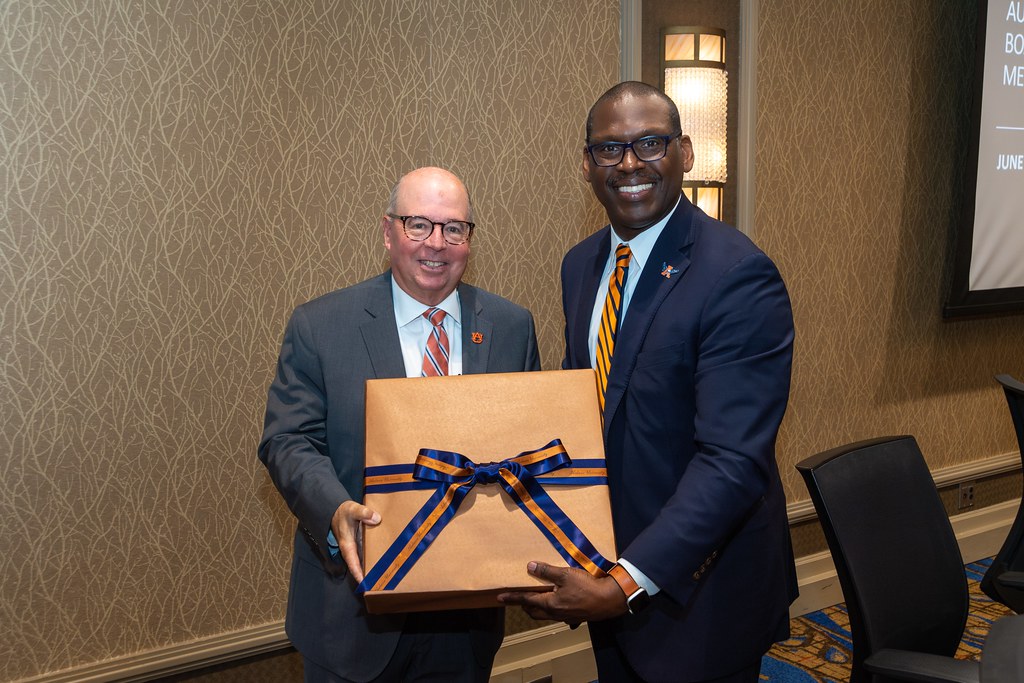Alumnus Quentin Riggins becomes first African American to serve as president pro tempore of Auburn Board of Trustees
Article body
Quentin Riggins, who helped Coach Pat Dye’s Auburn football team to three consecutive Southeastern Conference championships from 1987-89, has been elected as the president pro tempore of Auburn’s Board of Trustees, making him the first African American to serve in this capacity.
Board members made the election at its annual meeting on June 9.
Riggins, who earned a bachelor’s degree in marketing and distributive education from Auburn, has been a trustee since 2017. He is currently the senior vice president of governmental and corporate affairs for Alabama Power.
Also at the meeting, the board accepted a proposal to create a research laboratory that will allow the Samuel Ginn College of Engineering to better utilize federal grant monies in the study of low-emission vehicles.
The location, cost and architect for the Vehicle Research and Innovation Laboratory will be determined in the coming months. Funding, however, is expected to come from a U.S. Federal Transit Administration grant and Ginn College of Engineering funds.
Steve Taylor, Auburn’s newly named senior vice president for research and economic development and former associate dean for research for the Ginn College of Engineering, said the testing facility will allow researchers to study the challenges faced by manufacturers of commercial vehicles, such as trucks and transit buses, as they innovate and deploy new technologies to make vehicles more efficient, with increased levels of safety and reduced emissions.
He said researchers have been testing components used in those vehicles, but a sizable facility will allow for testing of the vehicles themselves. The laboratory is expected to provide a multi-axle dynamometer within an environmental chamber to allow simulation of extreme temperature and humidity operating conditions, as well as component and engine testing areas, data analytical space and general office space.
With the board acting to initiate the project, the university will now begin the architect selection process.
During committee meetings, President Christopher B. Roberts recognized Vini Nathan as the newly named provost and senior vice president for academic affairs. Nathan, in turn, acknowledged Mario Eden, who began his term as the Ginn College of Engineering’s new dean on May 15, and Leigh Ann Ross, who will begin her term as the new dean of the Harrison College of Pharmacy on July 1.
During the board meeting, Roberts acknowledged Taylor for his new role and thanked James Weyhenmeyer, who stepped down in May from his role as the senior vice president for research and economic development. Roberts also recognized Lt. Gen. (Ret.) Ronald Burgess, who is retiring at the end of June, for his service to the university as executive vice president.
In other matters, the board:
- Granted final approval to expand the runway safety area at the Auburn University Regional Airport. The board previously acted to purchase approximately 11 acres in the Indian Pines Golf Course from the cities of Opelika and Auburn to extend the current safety area on the northern end of Runway 18-36. The Federal Aviation Administration (FAA) requested the action as the airport continues to grow the volume of its operations. The airport’s general consultant, Barge Design Solutions of Dothan, Alabama, was previously named project engineer. FAA and state and local partners will finance the project.
- Granted final approval to construct an addition to the College of Veterinary Medicine’s North Auburn Equine Research Facility to support the federally funded research program. The project will construct a one-story, 8,100-square-foot addition, which will provide new laboratory space necessary to grow the research capabilities of the laboratory to match increased new grant funding opportunities. The College of Veterinary Medicine and the Office of the Provost will finance the $7 million project. Poole & Company Architects LLC of Birmingham, Alabama, was previously named project architect.
- Selected Seay, Seay & Litchfield of Auburn, Alabama, as the project architect for the renovation of space in the Athletics Complex to provide expanded sports medicine services. These services, currently housed in the Plainsman Park Strength and Rehabilitation Center, will be relocated to the Athletics Complex in space previously occupied by the football program. This project will enable the Athletics Department to expand and improve sports medicine services to its student-athletes.
- Accepted a proposal from the College of Forestry, Wildlife and Environment to establish a new Bachelor of Science in parks and recreation management. The new degree is aimed at students seeking knowledge and skills in the administration of recreation areas, including business and profit capabilities of outdoor adventure pursuits. It is the only degree of its kind in Alabama.
Appointed PricewaterhouseCoopers to serve as external auditors of the university for the fiscal year ending Sept. 30.
- Accepted a proposal from the College of Sciences to create a Bachelor of Arts in biology. The new degree program would provide AUM students with an alternative to the current Bachelor of Science in biology, allowing them more flexibility as they navigate STEM careers. Notably, this degree pairs with the new AUMTeach program that offers students the opportunity to major in select STEM degrees, including biology, and to minor in secondary STEM Education. The new degree also provides students in the pre-health, pre-nursing and pre-medical laboratory science programs an alternate path to degree completion.
Related Media
Media interested in this story can contact Communications Director Preston Sparks at (334) 844-9999 or preston.sparks@auburn.edu.
Auburn University is a nationally ranked land grant institution recognized for its commitment to world-class scholarship, interdisciplinary research with an elite, top-tier Carnegie R1 classification, life-changing outreach with Carnegie’s Community Engagement designation and an undergraduate education experience second to none. Auburn is home to more than 30,000 students, and its faculty and research partners collaborate to develop and deliver meaningful scholarship, science and technology-based advancements that meet pressing regional, national and global needs. Auburn’s commitment to active student engagement, professional success and public/private partnership drives a growing reputation for outreach and extension that delivers broad economic, health and societal impact.





